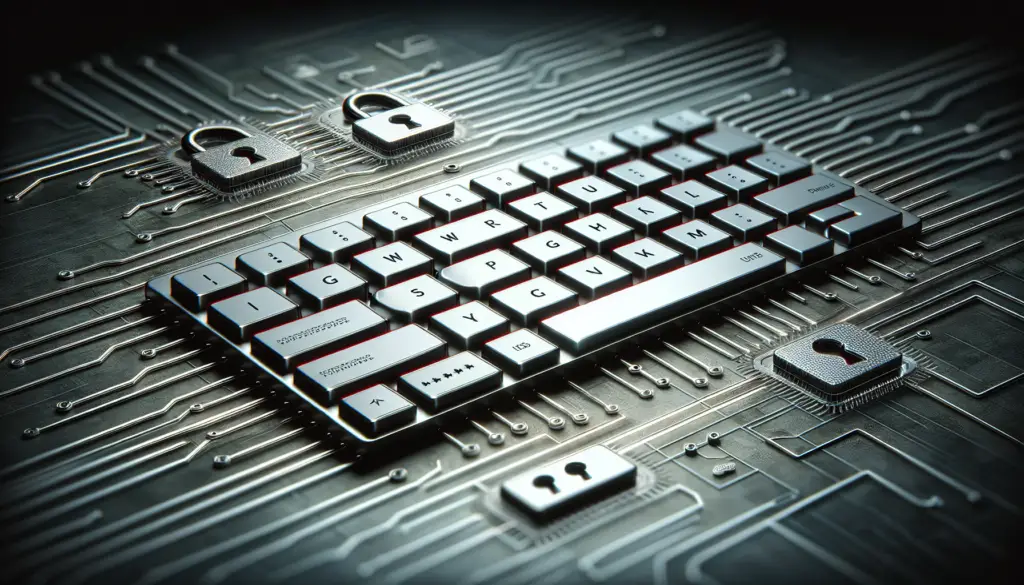Imagine a tool that effortlessly blends security and memorability, crafting the perfect key to safeguard your digital life. That’s the essence of a Multi Word Password Generator.
It’s an ingenious way to create complex yet easily recallable passwords, using a series of random words strung together to form a unique passphrase.
With the rise of hacking incidents, having a robust password is more crucial than ever, and this generator offers a tailored solution that’s tough for cybercriminals to crack but a breeze for you to remember.
So, let’s walk through how this nifty gadget can fortify your online fortress with a step-by-step approach that will leave you feeling both secure and savvy.

Understanding Multi Word Passwords
Definition and significance of multi-word passwords
You might be familiar with traditional passwords, which are usually a mix of letters, numbers, and symbols.
Multi-word passwords, often called passphrases, entail stringing together several words to form a password.
This method increases the complexity and length of your password, making it more secure against brute force attacks and easier for you to remember.
The significance of multi-word passwords lies in their ability to improve your digital security without compromising usability.
Comparison with traditional passwords
Compared to traditional passwords, multi-word passwords typically have a higher number of characters.
This means they have a greater entropy, which is a measure of randomness and unpredictability.
Where a traditional password might be a difficult-to-remember combination of characters like “F@7mP!x2”, a multi-word password could be a series of unrelated words like “coffeeBridgeSunsetStar”.
The latter is not only easier for you to remember but also more challenging for hackers to guess or crack.
The role of memorability and security in passphrase design
The design of a passphrase requires a balance between memorability and security.
A memorable passphrase is one that you can recall without effort, but it also needs to be complex enough to deter potential intruders.
Using a series of random, unrelated words can be a strong approach, as it increases complexity while remaining memorable if the words evoke a vivid image or concept in your mind.
The Basics of a Password Generator
What is a password generator?
A password generator is a tool that automatically creates passwords for you.
These passwords are generated based on certain criteria, such as length and the inclusion of various character types.
It helps remove the guesswork and ensures that the passwords you use are strong and secure.
Types of password generators
Password generators can be of various types, from simple online tools to complex software programs.
There are deterministic generators that create passwords based on a predefined set of rules and random generators that use algorithms to generate unpredictable passwords.
Some password managers include built-in generators that create and store passwords for you.
Benefits of using a password generator
The primary benefit of using a password generator is enhanced security.
By generating complex and unique passwords, these tools significantly reduce the risk of your accounts being compromised.
They save you time and relieve you of the burden of creating and remembering multiple strong passwords.
Why Choose a Multi Word Password Generator
Enhanced security features of multi-word passwords
Multi-word passwords garner their strength from length and complexity.
Since they tend to be longer than traditional passwords, cracking them by brute force attacks becomes impractical for hackers because the number of possible combinations skyrockets.
The ease of remembering multi-word passwords
You’ll find multi-word passwords much easier to remember than traditional complex passwords.
They can often form a sort of narrative or image in your mind.
For instance, “DolphinBookMountainLight” is more likely to be remembered as an odd story or visualization than a random string of characters.
Resisting common attacks with multi-word passwords
Multi-word passwords offer resistance to common attacks such as dictionary attacks because they’re not single words found in a dictionary but strings of words placed together.
Phishing attempts may also be less successful as the unique structure of these passwords makes them less predictable and more personal to your own memory banks.
Key Features of a Multi Word Password Generator
Randomization in password generation
Your multi-word password generator should assure high levels of randomization.
This makes each passphrase it generates unique and secure, by ensuring that the words selected don’t follow any predictable patterns.
This randomness is what provides security against attackers who use algorithmic methods to crack passwords.
Word list selection and source
An important feature of a multi-word password generator is the word list it uses to construct passphrases.
The source of this list should be extensive and varied to prevent repetitions and patterns that could weaken your passphrase.
Additionally, the word list should also be free of common passwords and easily guessed terms.
Customization options for users
It’s essential that a multi-word password generator offers you customization options.
You should be able to adjust criteria such as the number of words, word length, and the addition of numbers or special characters (if desired) to fit different security requirements and personal preferences.

Algorithm Behind Multi Word Password Generators
How randomness is ensured in password creation
Ensuring randomness in password creation is paramount to security.
To achieve this, multi-word password generators often leverage complex algorithms like cryptographically secure pseudorandom number generators (CSPRNGs).
These ensure that the output — your passwords — doesn’t show any predictable patterns.
Ensuring the uniqueness of generated passwords
Uniqueness is as important as randomness.
The algorithm should ensure that it doesn’t repeat passphrases for you or any other user.
This greatly reduces the risk of having a passphrase compromised, knowing that it hasn’t been issued to someone else before.
Balancing security and usability in the algorithm
While keeping passwords secure, it’s also crucial to balance usability.
The algorithm of a multi-word password generator must be designed to create passwords that are hard for others to crack but easy for you to remember.
Secure yet user-friendly passwords encourage good security habits, such as avoiding the reuse of passwords across accounts.
Building Your Own Multi Word Password Generator
Selecting a programming language
If you wish to build your own multi-word password generator, start by selecting a programming language.
You might opt for Python, Java, or JavaScript, considering the ease of string manipulation and the availability of libraries to help with random number generation.
Gathering a word list for password generation
Next, gather a large and diverse word list.
It could be sourced from standard dictionaries, literature, or specialized vocabulary lists, ensuring there’s a good mix of common and obscure words.
Make sure that the list doesn’t include easily guessed words like ‘password’ or ‘123456’.
Writing the code for password generation
With the language chosen and word list in hand, you can begin writing the code.
Your program should be able to select words randomly from your list and string them together according to the customization choices.
Implement good random number generation practices to maintain the security of the passwords.
Testing the password generator’s effectiveness
After writing the code, you need to thoroughly test your password generator.
Ensure that it doesn’t produce predictable or repeated passwords and that it adheres to the security criteria you’ve set out.
Testing is a continuous process to keep your generator robust and secure.
User Guide for a Multi Word Password Generator
Inputting criteria for password generation
When using a multi-word password generator, start by inputting your desired criteria for password generation.
This may include the number of words, desired password length, inclusion of numbers, and special characters.
Understanding output options and security levels
After setting your criteria, you should understand the output options.
Depending on the tool, you may be able to see the strength of the generated password or choose different security levels.
Higher security levels usually entail longer, more complex passwords.
Storing generated passwords securely
Once you have your generated passwords, it’s pivotal to store them securely.
You might use a trustworthy password manager or other secure methods of storage.
Remember, a strong password is only effective if it remains confidential.
Evaluating Multi Word Password Generators
Criteria for evaluating password strength
When evaluating a multi-word password generator, look for one that creates passwords meeting established criteria for strength.
This includes sufficient length, randomness, the inclusion of various character types, and the absence of dictionary words.
Reviewing user interface and ease of use
The user interface should be intuitive and straightforward, allowing you to easily input your requirements and understand the results.
Ease of use is crucial because it encourages the regular generation of new, strong passwords.
Assessing the security measures of the generator software
Lastly, assess the generator’s security measures.
Research whether the tool has been reviewed or vetted by security professionals, and whether it has a history of vulnerabilities.
Reliable generators are transparent about their algorithms and the measures they take to protect your data.
Security Practices for Multi Word Passphrases
Regularly updating multi-word passphrases
Just as with any password, it’s wise to regularly update your multi-word passphrases.
Set a calendar reminder to change your passwords every few months to reduce the chance of them being compromised.
Using multi-word passphrases in conjunction with other security tools
Multi-word passphrases should be used as part of a broader security strategy that includes other tools such as antivirus software, firewalls, and VPNs.
This multi-layered approach ensures that even if one defense is breached, others are still in place to protect you.
Educating users on the importance of secure password handling
Educate yourself and others on the importance of secure password handling to further reinforce security.
This includes not sharing passwords, avoiding the use of the same password across multiple sites, and being aware of phishing scams.
Best Practices When Using Multi Word Passwords
Balancing passphrase length and complexity
Find a balance between passphrase length and complexity that suits your needs.
Longer passphrases are typically more secure, but they should still be manageable and not so complex that they’re hard to remember or type.
Combining multi-word passwords with two-factor authentication
For enhanced security, combine your multi-word passwords with two-factor authentication (2FA).
This adds an extra layer of security, as accessing your accounts requires something you know (your password) and something you have (a device for 2FA).
Guidelines for multi-word password renewal and reuse policies
Implement guidelines for renewing and reusing passwords.
Regularly change your passphrases and avoid reusing them across different sites and services.
This helps to minimize the impact if one of your accounts is compromised.

